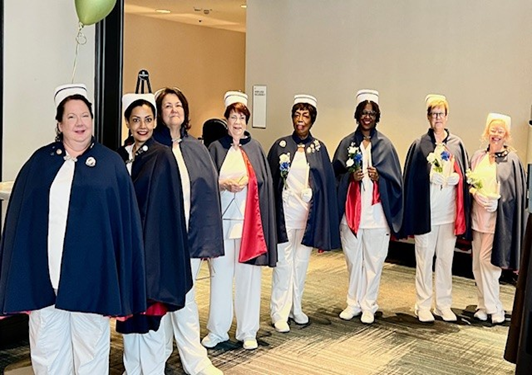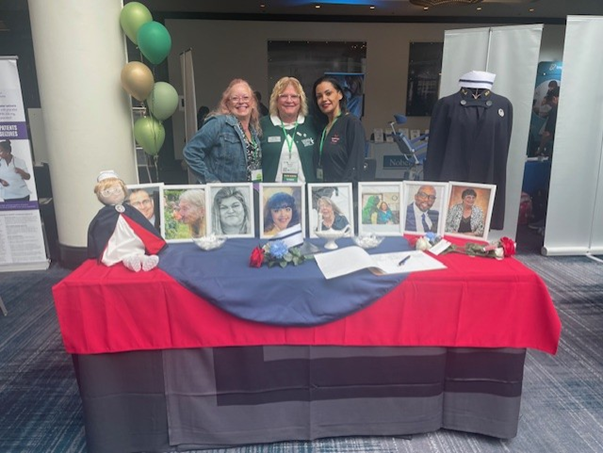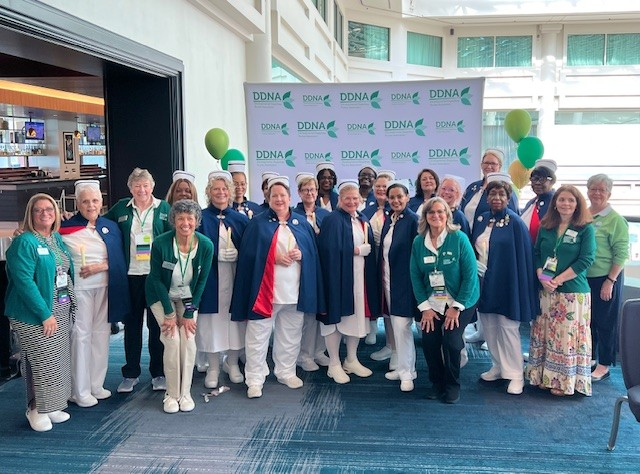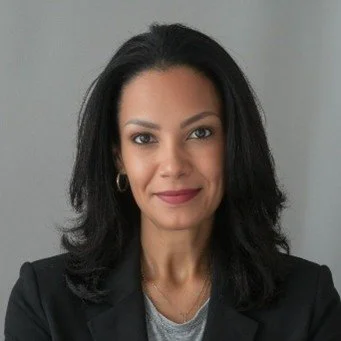Nurses Tribute: A Needed Reminder of Those Who Were There
Introduction by Rick Rader, MD, Editor-in-chief, HELEN
“Reputation is what other people know about you. Honor is what you know about yourself.”
-Lois McMaster Bujold
Honor guards have a rich historical significance rooted in military tradition, primarily serving to represent the honor and discipline of armed forces. Their origins can be traced back to ancient civilizations where warriors showcased their valor through ceremonial displays. This legacy continues today, symbolizing national pride and respect.
Throughout history, honor guards have played pivotal roles in significant events, from royal ceremonies to military functions. They served not only as protectors, but also as embodiments of the state’s authority. This dual responsibility has established honor guards as vital components of state functions worldwide.
In modern times, the role of honor guards has evolved, incorporating ceremonial duties during national parades, funerals, and memorials. Their presence adds gravity to occasions, thereby reinforcing the societal value placed on military service. The continued reverence for honor guards reflects historical traditions that link past valor to contemporary national identity.
I have been to many tributes and ceremonies that have paid respect for individuals who have demonstrated a life of dedication to a great cause. I recently witnessed a ceremony that literally brought tears to my eyes.
I recently attended the annual conference of the Developmental Disabilities Nurses Association (DDNA, from May 2-5) in Baltimore. I have always admired the role, contribution, and dedication of this elite Corp of Nightingales.
One of the highlights of the conference was watching the DDNA Nurse Honor Guard ceremony. This is a tradition where nurses pay tribute to their departed brothers and sisters. It was executed with the highest level of respect, dignity, and reverence for those DDNA nurses who were officially relieved of duty to find the rest they both needed and deserved.
The procession of the Nurses Honor Guard, with the participants wearing traditional nursing uniforms (white caps, shoes, and blue capes) carrying candles and lamps (the symbol of the nursing profession) was a memorable and moving experience. It served as a much needed reminder that there are some of us who have devoted their lives to the comfort, support, and care of others—and that it is both our responsibility and privilege to point to them and chant, “they were there.”
THE CEREMONY
Good morning, everyone,
My name is Jessica Colon. I am the Founder and Board President of the Long Island Nurses Honor Guard, The NYS Coordinator for the National Nurses Honor Guard Coalition, the Nursing Administrator at AHRC NYC, the largest agency in NYS to support people with Intellectual and Developmental Disabilities and a PROUD ID/DD nurse for 19 years!
It is a privilege to be among a community of nurses whose compassion, advocacy, and commitment to individuals with developmental disabilities inspires me deeply.
Today, I want to share a story — not just of a tradition, but of a movement. A tribute born from love, built on respect, and sustained by nurses just like you.
The Nurses Honor Guard began in 2003, born out of a deep respect for our profession and the lives of those who dedicate themselves to the art and science of healing. It was initiated by the Kansas State Nurses Association, a quiet and dignified tribute that, for many years, was offered only locally. But as more nurses witnessed the honor guard ceremonies at conferences and gatherings, something stirred within them — a recognition of a need that existed across our profession, in every corner of our country.
In 2011, at a conference in Detroit, Michigan, a spark was lit. One nurse took the vision back to her Professional Practice group in Lansing. And in the audience that day was Julia Godby Murray. Julia saw that this simple, sacred tribute had the power to comfort grieving families and reconnect nurses to the soul of our calling. She saw the need to expand it — to make this gift of grace accessible to nurses everywhere.
Through quiet determination and a deep sense of purpose, Julia began reaching out. Social media became her bridge. One group became two. Then three. Today, she has helped more than 215 groups begin their journey. She founded the National Nurses Honor Guard Coalition — a place where groups help each other grow, where they share resources, and most importantly, where they share heart.
And it is not just the families who are comforted by this moment. It is the nurses who participate. Because of this calling we answered — to care for others, to work through holidays, late nights, and unimaginable challenges — it binds us together. Especially now, post-pandemic and all its trials, this ceremony is a reminder of why we became nurses in the first place. It heals the healer.
New groups are forming every day, driven by the same passion that led us into nursing in the first place — the desire to bring comfort, to bring healing, to be of service. And now, we extend that care beyond life, to honor our colleagues one final time.
THE TRIBUTE PERFORMANCE
Reader 1 (Millie):
Today, we represent the National Nurse Honor Guard, and it is our privilege to offer this tribute to the nursing careers of Louise Rozycki RN from PA, Michele Volpe RN from Brookfield Illinois , Harley Romelus RN from Rhode Island, Terri Lyons from New Hampshire, Mark Wahl MSN, RN from Rhode Island, Ellen McPhetres RN from New Hampshire, Cheryl Bales RN from Illinois, and Karen Green McGowan RN, Clinical Nurse Consultant from Tennessee
Nursing is a calling, a way of life. Nursing is a service profession that cannot be lived in isolation. Nurses rely on each other for collaboration, and for teamwork, and our efforts of caregiving. It is appropriate we honor our colleagues not only during their career, but also at the end of their life journey.
We thank them for their dedication and commitment to improving the lives of those entrusted to their care, as well as mentoring colleagues to help improve nursing care for generations to come.
Nurses here today honor our colleagues who are no longer with us, and their profession as a nurse. They are not remembered by their years as nurses, but by the difference they made during those years, by stepping into people’s lives at special moments.
Reader 2 (Ruth):
Poem: They Were There
When a calming, quiet presence was all that was needed,
When compassionate care with love, and excellence in patient care was provided,
They were there.
In the excitement and miracle of birth or in the mystery and loss of life,
When a silent glance could uplift a patient, family member or friend,
They were there.
At those times when the unexplainable needed to be explained, When the situation demanded innovative solutions, critical thinking, leadership, or patient advocacy
They were there.
To witness humanity - its beauty, in good times and bad, without judgment,
To embrace the woes of the world, willingly, and offer hope,
To provide a gentle touch, a firm push, or an encouraging word when
needed,
They were there.
And now, that it is time to be at the Greater One's side,
They are there.
Reader 3 (Deb):
At this time, we would like to invite all nurses to stand and remain standing where you are as we together pay tribute to our fellow colleagues.
Nurse(s) with white rose and blue carnation step forward
(Jolene, Margaret, Colleen, Deb, Crystal, Bev, Carrie)
To our fellow colleagues, we honor you on this day with a white rose and a blue carnation. The white rose symbolizes your devotion and commitment to your profession and shows honor and appreciation for being our Nursing colleague. The blue carnation symbolizes peace and serenity. May you rest in peace and may your Family, loved one’s ad colleagues find peace in the days ahead.
Nurse(s) with white rose and blue carnation(s) places flowers on the table, near the picture of the nurses being recognized and honored. All bow together to fellow colleagues’ photos being honored before returning to places in line.
Reader 4 (Carol):
The Nightingale Lamp is a symbol Florence Nightingale stood for, comfort and kindness, gentleness and courage, and unwavering devotion to duty. Perhaps even then she knew that the light from it would go on shining into the future.
May this nightingale lamp symbolize our honor for our nursing colleagues we are here to recognize and honor today.
It is an honor and privilege to pay tribute to our nursing colleagues who dedicated their lives to caring for others, and in doing so, showed respect to the Profession of Nursing.
The nurse with the lit lantern steps forward and places the lantern on the table with the photos of nurses being honored. She bows toward her colleagues’ photos before stepping back in line.
Nurse with Triangle: Ring Triangle after each time Nurses Name is read
Louise Rozycki RN please report for duty (ring triangle)
Michele Volpe RN please report for duty (ring triangle)
Harley Romelus RN please report for duty (ring triangle)
Terri Lyons RN please report for duty (ring triangle)
Ellen McPhetrs RN please report for duty (ring triangle)
Mark Wahl MSN, RN please report for duty (ring triangle)
Cheryl Bales RN please report for duty (ring triangle)
Karen Green McGowan Clinical Nurse Specialist please report for duty (ring triangle)
Our fellow colleagues, we officially release you from your Earthly Nursing Duties. Your service to others here on earth is done. We will take it from here. May you now rest in peace
(Please be seated.)
Reader 5 (Liz):
NURSE’S PRAYER:
We will end our Nightingale Tribute with the Nurse’s Prayer:
May I be a nurse like our fellow colleagues honored here today, Lord, with gentle healing hands
Who always speaks with kindness, who cares and understands,
And while I’m serving others as You would have me do,
Please help me to remember that I’m truly serving You.
Amen
The members of the group pay respect by turning and facing the photos of those being honored before proceeding off the stage and out of the room.
AFTER TRIBUTE
This is more than a ceremony. It is a promise. A promise that we will never forget the heart, the hands, and the humanity of those who stood beside us. The Nurses Honor Guard gives nurses a dignified farewell — and gives families the closure and pride they so deeply deserve.
Let’s bring this beautiful ceremony to more communities. Let’s ensure that no nurse’s legacy goes unrecognized. Let’s carry this light forward — together. We welcome all nurses, embracing diversity in race, age, and gender.
Thank you to all who have helped carry this vision forward. And to all those who will.
Because nurses never truly stop healing — not even after their final shift.
Thank you.
Jessica Colón, BSN, RN, is the Nurse Administrator at AHRC NYC, New York State’s largest agency supporting individuals with intellectual and developmental disabilities. With 19 years of nursing experience and over two decades in non-profit human services, she brings a deep commitment to compassionate care and advocacy. Jessica is the Founder and Board President of the Long Island Nurses Honor Guard and serves as the New York State Coordinator for the National Nurses Honor Guard Coalition. She is also an active member of both the National Developmental Disabilities Nurses Association and the NYS ID/DD Nurses Association.
A proud mother, wife, nurse, and mentor to young Latina high school students, Jessica’s passion for service runs in her family. In her leadership role, she oversees multiple nursing teams across departments, emphasizing empathy and advocacy in care. Recognized for her contributions, she was named a Long Island Business News 40 Under 40 honoree for Non-Profits in 2022 and included as a Marquis Who’s Who member in 2024.
Whatever it is, the way you tell your story online can make all the difference.






